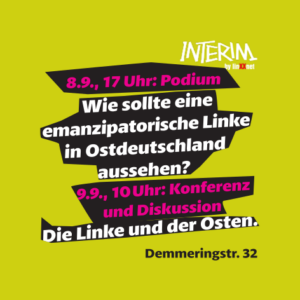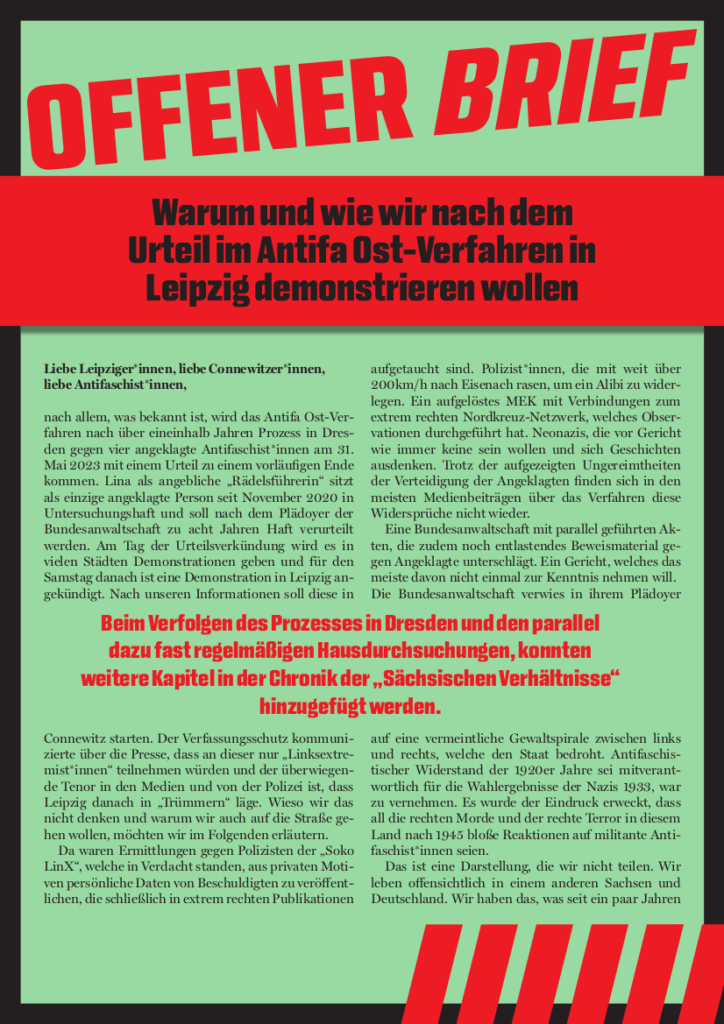+++ENGLISH, ARABIC, FARSI, UKRAINIAN BELOW+++ENGLISCH, ARABISCH, FARSI, UKRAINISCH UNTEN+++
Das, was vielerorts in Europa und an seinen Außengrenzen geschieht, soll nun in Gesetzesform gegossen werden. Wenn es nach den Regierungen der EU-Mitgliedsländer geht, wird die systematische Entrechtung, die Inhaftierung bis zu drei Monate, das Ignorieren von Schutzgesuchen und die Abschiebung von Schutzsuchenden in Länder, die sie nie zuvor gesehen haben, zu EU-Recht. Das haben die Regierungen, versammelt im Europäischen Rat, nun beschlossen, tatkräftig unterstützt von der EU-Kommission. Nach der Einigung kann allein das Europäische Parlament verhindern, dass das Asylrecht in der EU abgeschafft wird.
Wir akzeptieren nicht, dass Recht fundamental verschoben werden soll, dort wo es rechte, rechtsradikale, faschistische Akteur:innen sehen wollen. Wir sind wütend, dass es gerade die deutsche Bundesregierung mit ihrer Beteiligung der SPD und den Grünen nicht schafft, dem ganzen Vorhaben von Vornherein einen Riegel vorzuschieben. Wir sind die wehleidigen Töne leid, die vorgeben, dass es notwendig sei, Europa zur Festung auszubauen.
Am 20. Juni, dem Weltflüchtlingstag, treffen wir uns 18 Uhr auf dem Floßplatz. Wir ziehen weiter am Bundesverwaltungsgericht und Innenstadt vorbei über die Rosa-Luxemburg-Straße zum Rabet-Park. Wir werden neben dem Bundesverwaltungsgericht die Parteibüros von Grünen und SPD passieren und sie dort auffordern, das Vorhaben zu stoppen.
Was in der Debatte ganz deutlich werden muss: es braucht keiner Verhandlungen, ob ausschließlich unbegleitete Minderjährige von den Regelungen ausgeschlossen werden sollen oder nicht doch auch Familien. Derlei Verhandlungen sind humanitäre Feigenblätter! Es braucht einen fundamentalen Wechsel in der EU-Asylpolitik! Die Blaupause dafür ist gelegt. Selbiger Europäischer Rat aus EU-Regierungen hat eine humanitäre und adäquate Lösung für eine Fluchtbewegung beschlossen. Das ist ein wenig mehr als ein Jahr her und betraf die aus der Ukraine Fliehenden. Sie genießen heute temporären Schutz und sind im Besitz ihrer Grundrechte. So, wie das sein soll und muss!
Anstatt aus dieser positiven Erfahrung zu lernen, soll das schon heute so desaströs funktionierende, alle Beteiligten frustrierende und Betroffene zerstörende EU-Asylsystem noch weiter ausgebaut werden.
Zeigt den Steigbügelhaltern rechter Abschottungspolitik, was Solidarität ist!
Aufruf bisher von linXXnet, SDS Leipzig, Protest LEJ, Space Leipzig, Prisma Leipzig.
ما يحدث في العديد من الأماكن في أوروبا وعلى حدودها الخارجية هو الآن على وشك أن يصبح قانونًا. إذا كان لحكومات الدول الأعضاء في الاتحاد الأوروبي طريقها ، فإن الحرمان المنهجي من الحقوق ، والاحتجاز لمدة تصل إلى ثلاثة أشهر ، وتجاهل طلبات الحماية ، وترحيل طالبي الحماية إلى دول لم يسبق لهم رؤيتها من قبل سيصبح قانونًا في الاتحاد الأوروبي. هذا ما قررته الآن الحكومات المجتمعة في المجلس الأوروبي ، بدعم نشط من مفوضية الاتحاد الأوروبي. بعد الاتفاق ، يمكن للبرلمان الأوروبي فقط منع إلغاء حق اللجوء في الاتحاد الأوروبي.
نحن لا نقبل أن يتم تحويل القانون بشكل أساسي إلى حيث تريد الجهات الفاعلة اليمينية واليمينية الراديكالية والفاشية رؤيته. نحن غاضبون من أن الحكومة الألمانية بمشاركتها في الحزب الاشتراكي الديمقراطي والخضر لا تنجح في وضع حد للمشروع بأكمله منذ البداية. لقد سئمنا النغمات الصاخبة التي تتظاهر بضرورة تحويل أوروبا إلى حصن.
في 20 يونيو ، اليوم العالمي للاجئين ، سنلتقي في الساعة 6 مساءً. في Floßplatz. سوف نسير عبر المحكمة الإدارية الفيدرالية ووسط المدينة عبر Rosa-Luxemburg-Straße إلى Rabet park. بجانب المحكمة الإدارية الاتحادية ، سنمر بمكاتب حزب الخضر والحزب الاشتراكي الديمقراطي ، حيث سنطالبهم بإيقاف المشروع.
ما يجب توضيحه في المناقشة هو أنه لا توجد حاجة لإجراء مفاوضات حول ما إذا كان يجب استبعاد القصر غير المصحوبين فقط من اللوائح أو ما إذا كان ينبغي استبعاد العائلات أيضًا. مثل هذه المفاوضات هي أوراق تين إنسانية! هناك حاجة إلى تغيير جذري في سياسة اللجوء في الاتحاد الأوروبي! تم وضع مخطط لذلك. قرر نفس المجلس الأوروبي لحكومات الاتحاد الأوروبي حلًا إنسانيًا ومناسبًا لحركة اللاجئين. كان هذا قبل أكثر من عام بقليل وكان مصدر قلق للفرار من أوكرانيا. إنهم يتمتعون اليوم بحماية مؤقتة ويتمتعون بحقوقهم الأساسية. كما ينبغي ويجب أن يكون!
بدلاً من التعلم من هذه التجربة الإيجابية ، فإن نظام اللجوء في الاتحاد الأوروبي ، الذي يعمل بالفعل بشكل كارثي ، مما يحبط كل المعنيين ويدمر المتضررين ، سيتم توسيعه بشكل أكبر.
أظهروا لحاملي ركاب السياسات اليمينية الانعزالية ما هو التضامن!
اتصل الآن عن طريق linXXnet و SDS Leipzig و Protest LEJ
آنچه در بسیاری از نقاط اروپا و در مرزهای خارجی آن اتفاق میافتد، اکنون باید به قانون تبدیل شود. اگر دولتهای کشورهای عضو اتحادیه اروپا راه خود را داشته باشند، سلب حق رای سیستماتیک، حبس تا سه ماه، نادیده گرفتن درخواستهای حمایت و اخراج کسانی که به دنبال حمایت هستند به کشورهایی که قبلاً هرگز ندیدهاند، به قانون اتحادیه اروپا تبدیل میشود. این همان چیزی است که دولتها که در شورای اروپا جمعآوری شدهاند، اکنون تصمیم گرفتهاند که فعالانه توسط کمیسیون اتحادیه اروپا حمایت میشود. پس از توافق، تنها پارلمان اروپا می تواند از لغو حق پناهندگی در اتحادیه اروپا جلوگیری کند.
ما نمی پذیریم که قانون باید اساساً به جایی منتقل شود که بازیگران راستگراهای افراطی و فاشیست می خواهند آن را ببینند. ما خشمگین هستیم که به ویژه دولت فدرال آلمان، با مشارکت SPD و جذب سبزها، قادر به توقف کل پروژه از همان ابتدا نیست. ما از لحن های خود ترحم آمیز که وانمود می کنند لازم است اروپا را تقویت کنیم، خسته شده ایم.
در 20 ژوئن، روز جهانی پناهندگان، ساعت 6 بعد از ظهر در Floßplatz ملاقات خواهیم کرد. از دادگاه اداری فدرال و مرکز شهر از طریق جاده Rosa-Luxemburg-Strasse به طرف Rabet Park می گذریم.
ما از دفاتر حزب سبزها و SPD در کنار دادگاه اداری فدرال عبور می کنیم و از آنها می خواهیم که پروژه را متوقف کنند. آنچه در بحث باید کاملاً مشخص شود: نیازی به مذاکره در مورد اینکه آیا فقط خردسالان بدون همراه باید از مقررات خارج شوند یا خانواده ها نیز باید حذف شوند، وجود ندارد. چنین مذاکراتی برگ انجیر بشردوستانه است! تغییر اساسی در سیاست پناهندگی اتحادیه اروپا لازم است! طرح اولیه برای این کار گذاشته شده است.
همان شورای اروپایی دولت های اتحادیه اروپا در مورد یک راه حل بشردوستانه و کافی برای جنبش پناهندگان تصمیم گرفته است. این کمی بیش از یک سال پیش بود و بر کسانی که از اوکراین فرار می کردند تأثیر گذاشت. امروزه آنها از حمایت موقت برخوردارند و حقوق اساسی خود را در اختیار دارند. همانطور که باید باشد! به جای درس گرفتن از این تجربه مثبت،
سیستم پناهندگی اتحادیه اروپا، که در حال حاضر به طرز فاجعه باری کار می کند و همه دست اندرکاران را ناامید و نابود می کند، باید حتی بیشتر گسترش یابد. به رکاب داران سیاست انزوای جناح راستگرا نشان دهید که همبستگی چیست!
Європа-притулок, а не Європа-фортеця
Те, що вже відбувається в багатьох місцях Європи та на її зовнішніх кордонах, ось-ось стане законодавчо закріпленим. Якщо уряди країн-членів ЄС доб’ються свого, систематичне позбавлення прав, затримання на строк до трьох місяців, ігнорування прохань про захист і депортація шукачів захисту в країни, яких вони ніколи не бачили, стануть законом ЄС. Саме так вирішили уряди, що зібралися в Європейській Раді, за активної підтримки Європейської Комісії. Після підписання угоди лише Європейський парламент може перешкодити скасуванню права на притулок в ЄС.
Ми не згодні з тим, що право має бути фундаментально зміщене туди, де його хочуть бачити праві, праворадикальні, фашистські актори. Ми обурені тим, що німецький уряд за участю СДПН і “зелених” не спромігся зупинити весь цей проект від самого початку. Ми втомилися від плаксивих тонів, які вдають, що необхідно перетворити Європу на фортецю.
20 червня, у Всесвітній день біженців, ми зустрінемося о 18:00 на площі Флоссплатц. Ми пройдемо повз Федеральний адміністративний суд і центр міста через вулицю Рози Люксембург до парку Рабет. Поруч з Федеральним адміністративним судом ми пройдемо повз партійні офіси Зелених і СДПН, де закликатимемо їх зупинити проект.
Під час дебатів необхідно чітко заявити, що не потрібно вести переговори про те, чи слід виключити з правил лише неповнолітніх без супроводу дорослих, чи також і сім’ї. Такі переговори є гуманітарним прикриттям. Такі переговори – це гуманітарне фігове листя! Необхідна фундаментальна зміна політики ЄС у сфері притулку! Основа для цього вже закладена. Та ж Європейська Рада урядів ЄС прийняла рішення про гуманне і адекватне рішення щодо руху біженців. Це було трохи більше року тому і стосувалося тих, хто тікав з України. Сьогодні вони користуються тимчасовим захистом і володіють своїми основними правами. Так має бути і так повинно бути!
Замість того, щоб вчитися на цьому позитивному досвіді, система притулку ЄС, яка вже функціонує так катастрофічно, розчаровуючи всіх учасників і знищуючи тих, кого вона зачіпає, планується ще більше розширити.
Покажіть прихильникам правої ізоляціоністської політики, що таке солідарність!
Заклик від linXXnet, SDS Leipzig та Protest LEJ, Space Leipzig
Refuge Europe, not Fortress EU
What is happening in many places in Europe and at its external borders already is now about to be put into law. If the governments of EU member states have their way, systematic deprivation of rights, detention for up to three months, ignoring requests for protection, and deportation of protection seekers to countries they have never seen before will become EU law. This is what the governments, gathered in the European Council, have now decided, actively supported by the EU Commission. After the agreement, only the European Parliament can prevent the right to asylum from being abolished in the EU.
We do not accept that law should be fundamentally shifted to where right-wing, radical right-wing, fascist actors want to see it. We are angry that the German government with its participation of the SPD and the Greens does not manage to put a stop to the whole project from the beginning. We are tired of the whiny tones that pretend that it is necessary to turn Europe into a fortress.
On June 20, World Refugee Day, we will meet at 6 p.m. at Floßplatz. We will march past the Federal Administrative Court and the city center via Rosa-Luxemburg-Strasse to Rabet Park. Next to the Federal Administrative Court, we will pass the party offices of the Greens and the SPD, where we will call on them to stop the project.
What must be made very clear in the debate is that there is no need for negotiations on whether solely unaccompanied minors should be excluded from the regulations or whether families should be excluded too. Such negotiations are humanitarian fig leaves! A fundamental change in EU asylum policy is needed! The blueprint for this has been laid. The same European Council of EU governments has decided on a humanitarian and adequate solution for a refugee movement. This was a little more than a year ago and concerned those fleeing from Ukraine. Today they enjoy temporary protection and are in possession of their fundamental rights. As it should and must be!
Instead of learning from this positive experience, the EU asylum system, which is already functioning so disastrously, frustrating everyone involved and destroying those affected, is to be expanded even further.
Show the stirrup holders of right-wing isolationist policies what solidarity is!
Call for now by linXXnet, SDS Leipzig and Protest LEJ, Space Leipzig, Prisma Leipzig
 Thesen// Paneldiskussion// Denkwerkstatt
Thesen// Paneldiskussion// Denkwerkstatt Anknüpfend an das Geschehen nach dem Urteil im Antifa Ost – Verfahren am 31. Mai und um das Demowochenende am 3./4. Juni in Leipzig wollen wir die Aufmerksamkeit auf die verschiedenen Aspekte von Grundrechtseinschränkungen, Polizeigewalt, Agieren von Justizbehörden und den rahmenden politischen Diskurs richten.
Anknüpfend an das Geschehen nach dem Urteil im Antifa Ost – Verfahren am 31. Mai und um das Demowochenende am 3./4. Juni in Leipzig wollen wir die Aufmerksamkeit auf die verschiedenen Aspekte von Grundrechtseinschränkungen, Polizeigewalt, Agieren von Justizbehörden und den rahmenden politischen Diskurs richten.
